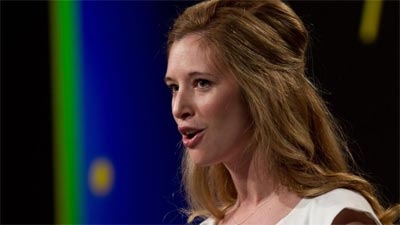New Traditions Bring in Younger Rotary Members
Posted by Don Bonner
on Aug 26, 2013
 At 29, Katie Ehlis knows first-hand the challenges of trying to fit the lifestyle of a young professional into a traditional club structure. After moving to Minneapolis, Minnesota, for work, this former Rotaractor visited several Rotary clubs to find the right connection.
At 29, Katie Ehlis knows first-hand the challenges of trying to fit the lifestyle of a young professional into a traditional club structure. After moving to Minneapolis, Minnesota, for work, this former Rotaractor visited several Rotary clubs to find the right connection."The people were fantastic, but the club structures weren't a good fit," Ehlis says. "I was getting started in my career, so showing up late to work once a week or taking two hours for lunch wasn't going to fly. And the dues were high for someone with a starting salary."
So she started a new club and became its president. Since its charter in 2010, the Rotary Club of South Metro Minneapolis Evenings has already achieved a goal that eludes many clubs: attracting young members. Most people in the club are in their 20s, and all are under age 40.
 The club was able to set dues fairly low because they don't offer meals or beverages at meetings. And in addition to holding their regular meetings in the evenings, one meeting a month is a volunteer event, such as helping at a local food pantry.
The club was able to set dues fairly low because they don't offer meals or beverages at meetings. And in addition to holding their regular meetings in the evenings, one meeting a month is a volunteer event, such as helping at a local food pantry.
"We also meet at a hotel once a month to hear a speaker, and many people gather beforehand in the hotel bar, like a happy hour," Ehlis says. "The club does have high turnover, but we're building passionate Rotarians. Even if people leave the club, once they get settled in the next city, they're most likely going to join a club or start their own."
Which is exactly what Ehlis did herself. In 2011 she moved to Denver and joined the Denver Southeast Rotary club. "It's a great club and the energy is like nothing I've seen," Ehlis says. "But I don't feel like I closed a door when I left, because I still have a close relationship with the club in Minneapolis."
Ehlis wants to continue bringing new blood into Rotary, but young members aren't her only target. "It's true that Rotary needs younger members – in 2009, 11 percent of Rotarians were under 40," she says. "But I'm focused on recruiting for a new generation of club member, and that isn't necessarily about a specific age."
She says people want to Skype into meetings and conferences when they can't attend in person, and she knows members who are looking to be more involved in decision making from the get-go, rather than waiting an arbitrary period of time. Young professionals are ready to make a difference in their clubs from day one.
By S.A. Swanson
This story originally appeared in the August 2012 issue of The Rotarian
1-JUL-2013
So she started a new club and became its president. Since its charter in 2010, the Rotary Club of South Metro Minneapolis Evenings has already achieved a goal that eludes many clubs: attracting young members. Most people in the club are in their 20s, and all are under age 40.
 The club was able to set dues fairly low because they don't offer meals or beverages at meetings. And in addition to holding their regular meetings in the evenings, one meeting a month is a volunteer event, such as helping at a local food pantry.
The club was able to set dues fairly low because they don't offer meals or beverages at meetings. And in addition to holding their regular meetings in the evenings, one meeting a month is a volunteer event, such as helping at a local food pantry."We also meet at a hotel once a month to hear a speaker, and many people gather beforehand in the hotel bar, like a happy hour," Ehlis says. "The club does have high turnover, but we're building passionate Rotarians. Even if people leave the club, once they get settled in the next city, they're most likely going to join a club or start their own."
Which is exactly what Ehlis did herself. In 2011 she moved to Denver and joined the Denver Southeast Rotary club. "It's a great club and the energy is like nothing I've seen," Ehlis says. "But I don't feel like I closed a door when I left, because I still have a close relationship with the club in Minneapolis."
Ehlis wants to continue bringing new blood into Rotary, but young members aren't her only target. "It's true that Rotary needs younger members – in 2009, 11 percent of Rotarians were under 40," she says. "But I'm focused on recruiting for a new generation of club member, and that isn't necessarily about a specific age."
She says people want to Skype into meetings and conferences when they can't attend in person, and she knows members who are looking to be more involved in decision making from the get-go, rather than waiting an arbitrary period of time. Young professionals are ready to make a difference in their clubs from day one.
By S.A. Swanson
This story originally appeared in the August 2012 issue of The Rotarian
1-JUL-2013